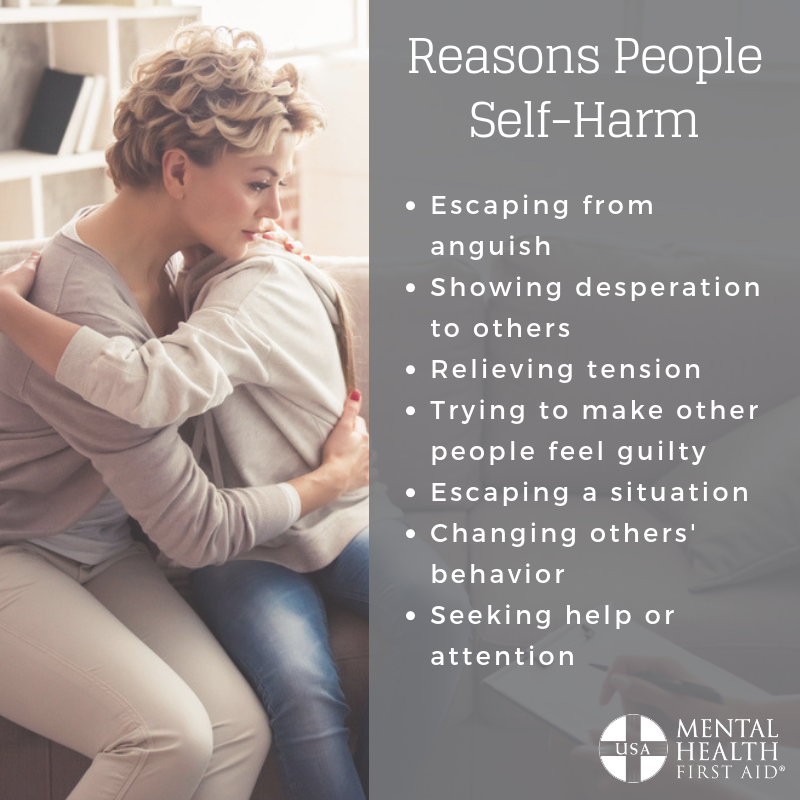By Mental Health First Aid USA on December 17, 2018
Updated on: December 18, 2018
IMPORTANT NOTE: If you’re not sure if someone is purposefully hurting themselves with suicidal intentions, please read our guide on how to help someone who is suicidal for more information on how to help make that determination. This article will only address nonsuicidal self-harm.
Self-harm – or self-injury – can arise in many different forms, and for the purposes of this article, it’s done for reasons other than attempting suicide.
Self-harm can consist of any of the following behaviors:
– Ripping or tearing skin.
– Carving words or shapes into skin.
– Cutting, pinching or scratching skin.
– Burning skin.
– Preventing wounds from healing.
– Pulling out hair.
– Punching or banging objects until they start to bleed.
– Purposefully overdosing on medication without suicidal intention.
It can be distressing to discover someone you know is self-injuring, but there are ways you can provide support.
This guide will help you understand the issue and explain how to help someone who self-harms.
Why People Self-Harm
Unfortunately, self-injury is relatively common in young adults. Those who engage in self-injury may do so for a variety of reasons, including:

As you can see, the reasons vary, and it’s important to realize that the self-harm is usually done in response to some level of distress. It’s a coping mechanism, so when you decide to help, you should focus on solving the distress, not the self-injuring behavior.
How to Help Someone Who Self-Harms
If you suspect someone you know is self-injuring, Mental Health First Aid teaches you to follow the ALGEE action steps:
- ASSESS for risk of harm: If you encounter someone self-harming, ask if medical attention is needed. If the person appears unconscious, confused or disoriented, or if the person has rapid bleeding, call 911. Also call 911 if you find someone who’s overdosed or ingested poison.
- LISTEN nonjudgmentally: If the person isn’t experiencing life-threatening injuries, begin a discussion with them. Explain what behavior you’ve noticed and that you’re concerned for their well-being. As you talk, it’s important to remain nonjudgmental. Don’t raise alarm or punish the person. Maintain a calm manner and try to find ways to relieve the source of the distress.
- GIVE reassurance and information: Always emphasize that recovery is possible. If they want or need more information about what they’re going through, tell them about S.A.F.E. Alternatives (Self-Abuse Finally Ends). They can read the resources online at selfinjury.com or they can call the information line at 1-800-DON’T-CUT (366-8288).
- ENCOURAGE appropriate professional help: Because self-injury is a symptom of an underlying issue, it’s important to support the person in finding the appropriate help. Often, the person is experiencing psychological distress or a mental illness that needs to be addressed. While you want to be persuasive, make sure the person is still making their own decisions about how to proceed with treatment. But you can feel free to call doctors to find one accepting new patients, go with them to appointments, offer to drive or help out in similar ways.
- ENCOURAGE self-help and other support strategies: Ask the person what has helped them feel better in the past or what supports – whether it’s family, friends, faith communities or other groups – have been beneficial. Encourage them to tap into those sources of comfort and to try other self-help strategies, like exercise, relaxation training or whatever best suits their situation.
To learn more strategies for supporting people, take Mental Health First Aid. The course will teach you how to identify, understand and respond to signs of mental health or substance use issues. Become part of a movement to change the culture around mental health.
When someone is facing a hardship, your help can make a world of difference.
